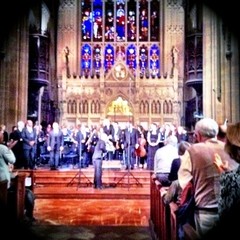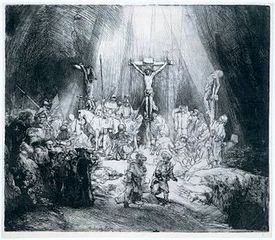|
Back
Drama on Gethsemane New York
Trinity Church, 75 Broadway
03/13/2016 -
Frank Martin: Golgotha
Meredith Lustig (Soprano), Avery Amereau (Mezzo-soprano), Dann Coakwell (Tenor: Pilate); Tyler Duncan (Baritone: Jesus), Kevin Deas (Bass-baritone: High Priest)
New Amsterdam Singers and Orchestra, Clara Longstreth (Music Director/Conductor), David Recca (Assistant Conductor), Pen Ying Fang (Accompanist)

Ensemble in Trinity Church (© Samuel A. Dog)
“I’ve never heard anything by Frank Martin which wasn’t gorgeous.”
Anon
Sixty-six years after its American premiere, the massive Passion-Oratorio by Frank Martin, Golgotha has finally had a second performance. The venue was the equally massive Trinity Church, and its ensemble of soloists, chorus and orchestra did the work proud.
Why, though, the long wait? Frank Martin’s piece is not overwhelmingly difficult, its structure basically in the line of Arthur Honegger’s oft-played Joan of Arc At the Stake. The emotional impact at times–at times!!–can be overwhelming. The subject matter, Christ’s final hours, is idea for Easter Week, an honest substitution for Bach’s Passion music. And any congregation can be moved by much of this music.
And yet American audiences are mainly unfamiliar with Frank Martin’s music, which is a shame. It is unfailingly colorful, , the concerto for harp, harpsichord and two string orchestras is a delight of colors, the cello concerto is a joy for any soloist, and his string music is as fine as any later post-Impressionist creations.
Golgotha, though, is different. The thundering opening is as shocking and frightening as anything in the liturgical literature. The closing five minutes, with its cascades of string and choral sounds, could stand on their own as the most joyous Easter music since Irving Berlin’s Easter Parade, and far more spiritual.
In between, though, Golgotha can be almost dank with cold, if deeply felt, lamentations. I had mentioned the closely related Joan of Arc, but that oratorio had moments of manic joy, illusion, magic. Honegger was a Swiss composer with enough of the “French” inside him to write good theater. Frank Martin, though, the religious son of a deeply Calvinist Swiss minister, living much of his life in Holland, took the Bach Passion with utter gravity, and his music reflects that grave solemnity.
Outside of the thunderous choral pieces, one had to follow Golgotha with intense concentration. I made a good effort at it (despite sitting for 90 minutes on the Trinity Church pews, where my crucified derriere called out constantly, “Father, why hast thou deserted me?”). And here, the varied musical invention ajnd expressive content seemed inexhaustible, power and fresh.

Rembrandt’s The Three Crosses (© Boston Fine Arts Museum)
What lassitude one felt was probably due to its double inspiration: Bach’s Passions, which had obsessed Martin throughout his whole life; and the copperplate/etchings of Rembrandt’s The Three Crosses, which are dark, shadowy, and fiercely tortuous.
So one must look beyond the disconsolate blackness for the inspirational light. The mystical long soprano solo, When shall I be so happy as to see…your Glorious beauty?, sung with transportional beauty by Meredith Lustig. And a fiercely original “trio” which could have been written by Berlioz in the Gethsemane section. Here, alto and tenor Avery Avereau and Dann Coakwell sung in unison, answered by Tyler Duncan as Jesus, in antiphonal phrasing.
Mr. Duncan, a veteran of the Metropolitan Opera, was indeed Jesus, singing with a melodious baritone throughout the entire Holy Week work.
While this was far more religious service than drama, Frank Martin made his effort at theater. Again, it was Mr. Coakwell with Mr. Duncan in a stunning Pilate-Jesus colloquy. This was a dramatic scene of the most exciting immediacy, with the New Amsterdam Singers answering as the “villains” choosing the freedom of Barrabas over Jesus. Kevin Deas, resounding as both bass-baritone commentator, and here as the High Priest, was striking in both characters.
Nothing, of course, can be greater than Bach’s condemnation of the populace choosing Barrabas the thief over the King of the Jews. But Martin, by adding the sensual words of Saint Augustine, had a sensuality in Golgotha which Bach never attempted. Perhaps Augustine’s words were metaphorical, but even Calvinist Martin couldn’t resist those lubricious words of love for the Savior.
The two major elements of Golgotha’s success yesterday were the New Amsterdam Singer and their contract orchestra, both of them conducted with electricity, and spot-on vitality by the New Amsterdam founder-conductor Clara Longstreth. I have no idea what she looked like to the musicians, but from behind, the white-haired maestro could have been an Old Testament patriarch.
Whether Golgotha can become a staple of Easter literature is questionable. Sections were so thrilling and colorful that they still register in my mind. Other sections are both cerebral and veiled. Yet by tackling this challenging work, Ms. Longstreth and her ensemble may have added a rare and serious masterpiece to our sacred literature.
Harry Rolnick
|